Alcohol and Eczema: #SkinGin and Sake
For as long as I can remember, I have been able to drink alcohol without any irritation to my eczema or skin. This changed in February of this year, when I stopped using the immunosuppressant ointment Protopic and my body was in full topical steroid withdrawal (TSW) mode.
Next day eczema flare up
I’ll never forget the night. I went out for sangria with a friend, which is a red wine based drink. I also had some rose that night. The next morning, my body was so intensely itchy and stiff, I felt like a crispy fried chicken. It took me over an hour to mobilize out of my bed!
Is alcohol an eczema trigger?
Unwilling to accept that wine could be the culprit for my skin’s extra level of discomfort, I posted a poll on my eczema awareness social media platform, @tickle.eczema, asking the community the question: “Does drinking alcohol make your skin more sensitive/itchy? (or the next day).” Of the 39 people that voted, 34 people voted yes (87%). This began my investigation into alcohol as a trigger for eczema!
Alcohol and eczema
Through some research, I learned that:
- Alcohol dilates our blood vessels, causing redness and flushing of the skin.
- Alcohol exacerbates leaky gut and impairs the body’s ability to process vitamin C and E, both causing inflammation and rashes.
- Sugary alcoholic drinks, like sangria, also cause inflammation of the skin.
- Wine specifically is made up of salicylates and histamines, which are compounds that can cause allergic reactions and skin sensitivities.
- Lastly, I found that people with eczema already have overworked livers and when you consume alcohol, your liver has to work even harder to filter out those toxins and chemicals.
Wine
I did not want to believe the research, so I tested a glass of Chardonnay. I kid you not, I had 2 sips and my body immediately felt dried out and super itchy. I decided that the discomfort I feel from wine is not worth it.
#Skingin
All of this information was very disappointing, so I decided to experiment with different types of liquor! Through the Tickle Instagram community, I learned that gin is acceptable to drink. There is even a hashtag for it - #skingin. Gin might be ok for our skin because it has low sugar content, is full of antioxidants, and is a natural diuretic that flushes out bacteria from our system. I was never a big gin drinker but you can find me sipping on gin and tonics these days! I have also experimented with beer and it makes me tingly and itchy.
Skin sake
I still miss wine very dearly, so I decided to experiment with Sake. Sake is a Japanese alcoholic drink made of fermented rice and water. Sake is typically gluten-free, low in histamines, acidity, and does not contain any sulfites like wine. Specifically, “Junmai” sake is what I’ve been drinking because it is classified as premium sake. It’s so delicious and doesn’t make me itchy or uncomfortable at all! My favorite brand is Kikusui Junmai Ginzo.
Finding wine and beer alternatives has been a game changer for me! Gin and Sake are my favorite alternatives I’ve discovered thus far. Some other tips I’ve learned are to drink water as I drink and to avoid super sugary drinks.

Join the conversation